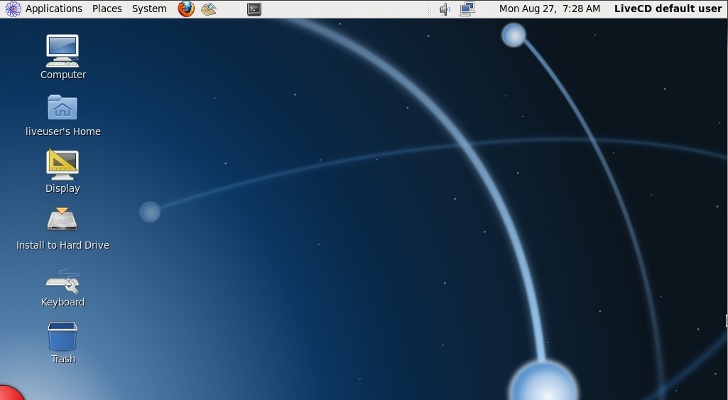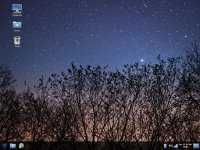 | |
Urs Beyerle announced last evening, August 26th, that the final version of the Scientific Linux 6.3 Live CD/DVD operating system is now available for download on mirrors worldwide.
Scientific Linux 6.3 is now based on Red Had Enterprise Linux 6.3, powered by Linux kernel 2.6.32, and features XOrg Server 1.7.7, IceWM 1.2.37, GNOME 2.28, Firefox 10.0.6, Thunderbird 10.0.6, LibreOffice 3.4.5.2 and KDE Software Compilation 4.3.4. Moreover, the distro includes software from rpmforge, epel and elrepo in order to provide support for NTFS and Reiserfs filesystems, secure network connection via OpenVPN, VPNC, PPTP, better multimedia support, and various filesystem tools like dd_rescue, gparted, ddrescue, gdisk. Scientific Linux 6.3 is distributed as Live CD and DVD ISO images, supporting both 32-bit and 64-bit architectures. The complete list of changes with a comprehensive list of fixes, improvements, removed and updated packages, can be found in the official release announcement for Scientific Linux 6.3 Live CD/DVD. Download Scientific Linux 6.3 Live CD/DVD |
How long has the open source crowd been shouting at the top of their lungs, “World domination!”? I ought to know the answer to that as the cry has been part and parcel to my own personal repertoire for over a decade. And why not? The Linux desktop has been a stable foundation on which users could always depend when they finally took the plunge. It worked, plain and simple.
But the detractors always had plenty of ammo to keep the desktop from gaining any traction.
- It didn’t run business-centric apps.
- There were no games.
- Windows is what everyone knows (and people do not like change).
That was pretty much it. Three simple reasons to seal the deal against Linux ever gaining any traction on the big stage. But, those times are changing and changing quickly.
I know — there are still plenty of readers shaking their heads claiming me nothing more than a day dreamer. But there’s a new reason to be hopeful these days.
With the release of Windows 8, not only is Microsoft poisoning the well of its users with a drastically different interface, it is also locking down Metro application installation to only those from the Microsoft App store. This is exaggerated even more on the ARM version of Windows 8 — in that only Metro apps can be installed. Only on Windows 8 x86 will you be able to run traditional applications.
What does this do to all of those businesses that have proprietary applications and have been putting their faith and budget into 64-bit architecture? For those — they will have to hope that Windows 7 will continue on for a long, long time.
But Microsoft has made it very clear they want developers developing for Metro — not legacy.
Microsoft is also in the development of their own brand of touchscreen tablet/notebook hybrid — thereby giving a cold shoulder to their current hardware partners (one of which is Dell who happens to be, once again, testing the Linux desktop markets — only this time with their high-end line of laptops).
And then, to add a nice creamy topping to this un-delicious cake — there’s the secure boot problem (which I’ve already covered). So, when you add all of this up and you include two things:
- The rise, again, of Ubuntu being the ‘cool kid’ on the block
- Valve and Blizzard both coming out (quite vocally) against the up-coming release of Windows 8 (and how it is going to negatively effect the PC world)
You can see the stage is set for that world domination Linux has cried out for all these years. But, here’s the rub (and the painful truth) — businesses are simply going to hold onto Windows 7 for as long as they can. We already see this with Windows XP. I still see so many XP machines out there and those machine will continue to run until they die. Period. Once they die, people will have a few choices:
- Purchase a Windows 8 machine and stick with Metro.
- Purchase a Windows 8 machine and pay for the downgrade to Windows 7.
- Purchase a PC (regardless of OS) and install a flavor of Linux.
- Purchase a Linux PC from the likes of System 76 or Dell.
- Purchase a Mac.
Obviously each choice has its pros and cons. The biggest con going against the Linux option is the lack of business-class applications (such as QuickBooks). But think of this scenario — what happens if Intuit opts to not re-write all of their code to work with Metro? They may as well port QuickBooks to Linux — and why wouldn’t they want to port their bread and butter to a more stable platform?
Eventually this is all going to come to a bottle neck and everyone is going to have to make a choice — and a hard choice at that. From my incredibly biased perspective, I highly recommend people (and businesses) begin the switch to the Linux desktop now. Make the switch, get your users accustomed to the new flavor of desktop, and enjoy a level of stability and reliability you (and your users) have never been used to. Most day to day business can be run from within a web browser anyway — even web-based Exchange email — and for those remaining applications, have a Windows machine (or two) around so users can work with QuickBooks until Intuit finally realizes there’s a pot of gold to be had with Linux.
I know there will be plenty of people out there who will balk at the idea of Linux gaining serious ground on the desktop. But when the reactions to Windows 8 start pouring in and people simply refuse to adopt, they will have to go somewhere. This will be the perfect opportunity for Linux distributions to pounce and show the world the Linux desktop is the best available option. It’s free, reliable, stable. secure, has tens of thousands of applications, and doesn’t suffer from the fundamental security flaws that Windows endures.
What do you think? Will the release of Windows 8 be the perfect storm Linux has been looking for over the past decade? And, if so, what is the best way for Linux distributions to take advantage?

